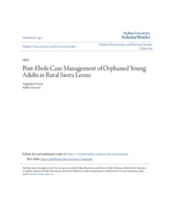Abstract
The 2014-2016 Ebola pandemic in Sierra Leone significantly increased the orphan population and the need for social support programs, especially for student-orphans in higher education. Poorly prepared disaster response managers have little knowledge about how college student-orphans experience social services. The purpose of this transcendental phenomenological study was to explore how post-Ebola student-orphans enrolled in an agricultural university in rural Sierra Leone experienced post disaster specialized case management to enhance student performance. Criterion sampling techniques including specific inclusion and exclusion criteria guided the recruitment, that included 10 research participants taking part in the semi structured interviews. Ecological system theory and postpositivist ontology informed this transcendental phenomenological research. The modified van Kaam transcendental phenomenological data analysis enabled the development of themes from lived experiences of post-Ebola case management for student-orphans. The findings of the research showed that student-orphans experienced specialized case management with three characterizations: (a) sadness, (b) happiness, and (c) anger which included information helpful for crisis and disaster case management administration and staff across similar circumstances. The social change implication for the study results include information useful for human service administrators and staff in designing and employing post disaster programs for college student-orphans.

